Unit 3 How do you get to school? Section B (2a~self-check) 课件(共53张PPT)+内嵌视频
文档属性
| 名称 | Unit 3 How do you get to school? Section B (2a~self-check) 课件(共53张PPT)+内嵌视频 | 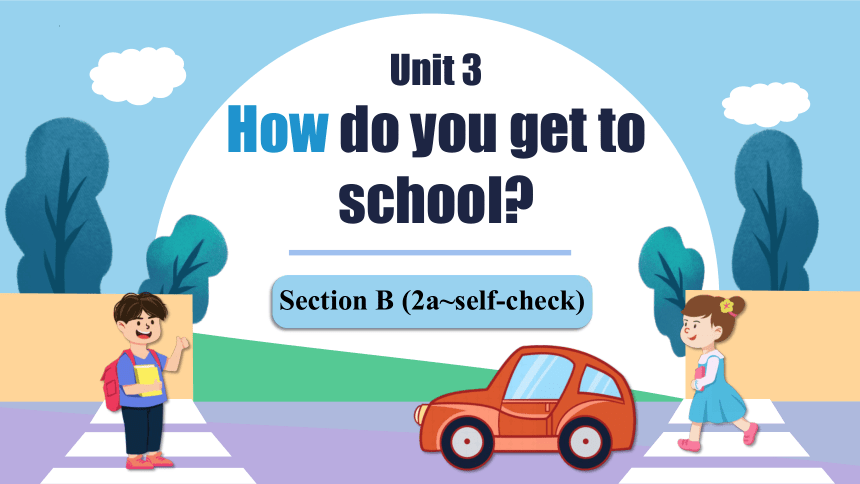 | |
| 格式 | pptx | ||
| 文件大小 | 52.3MB | ||
| 资源类型 | 教案 | ||
| 版本资源 | 人教新目标(Go for it)版 | ||
| 科目 | 英语 | ||
| 更新时间 | 2024-03-01 19:54:11 | ||
图片预览

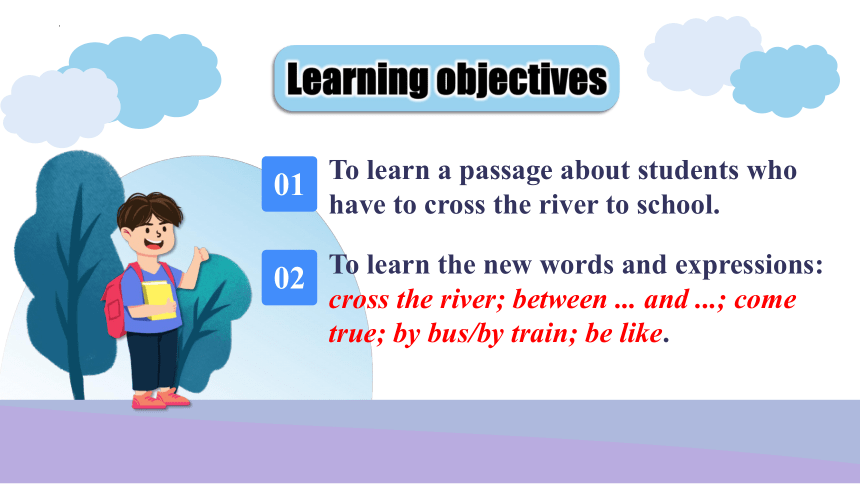
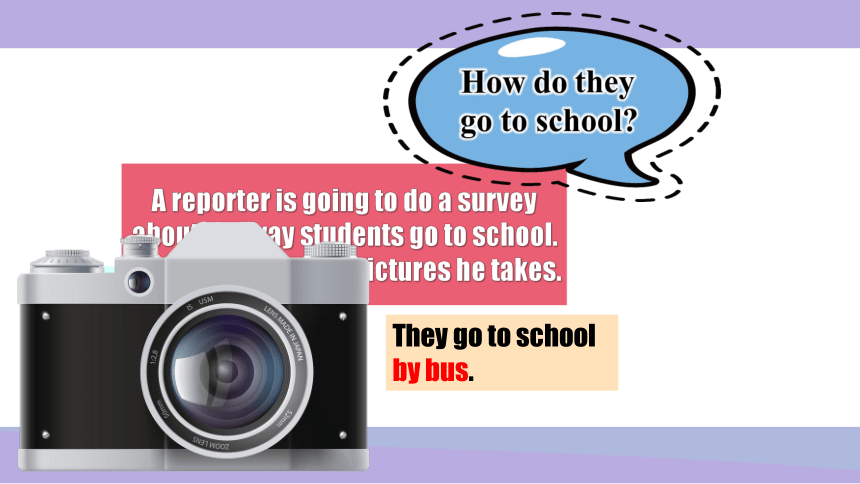
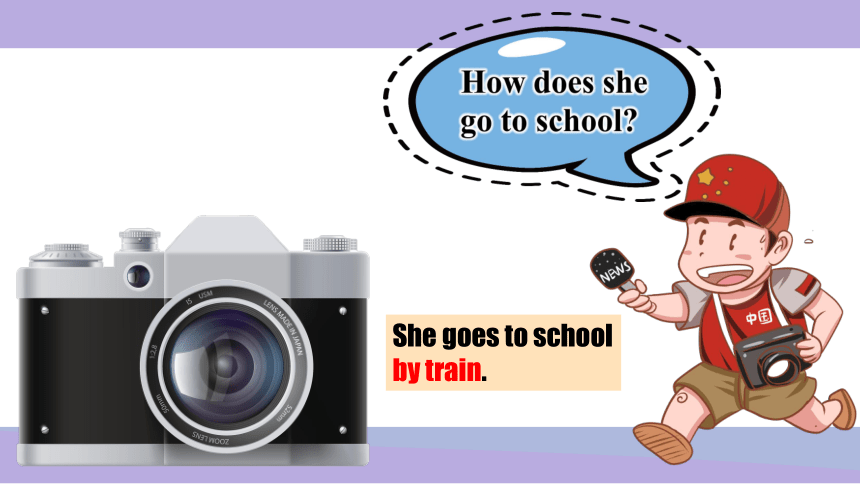
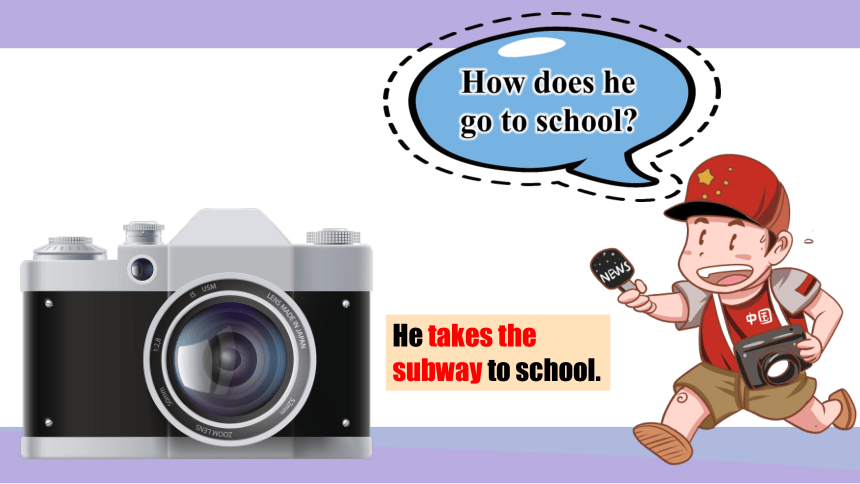
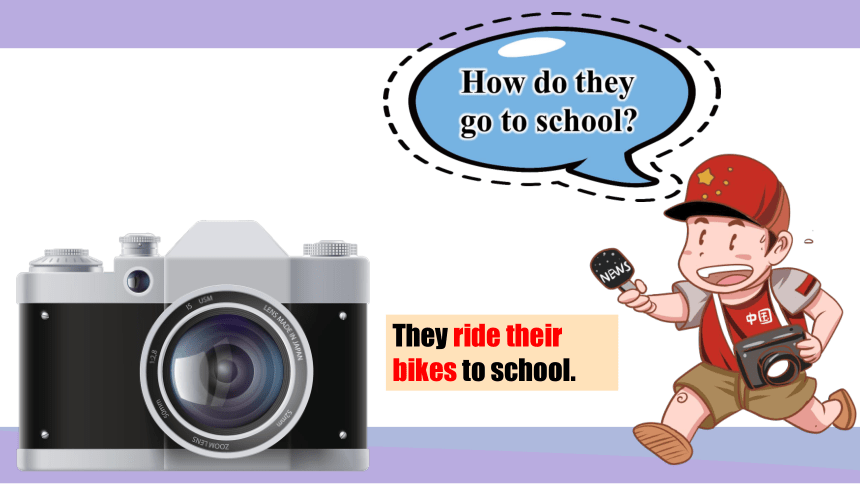
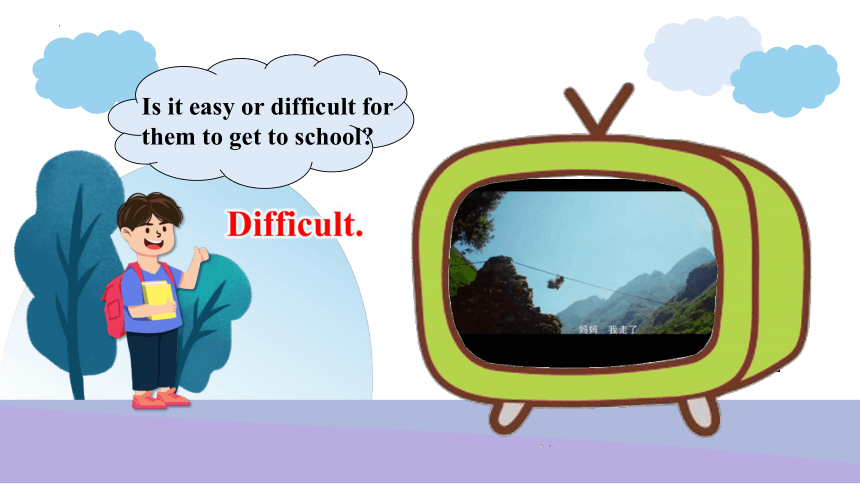

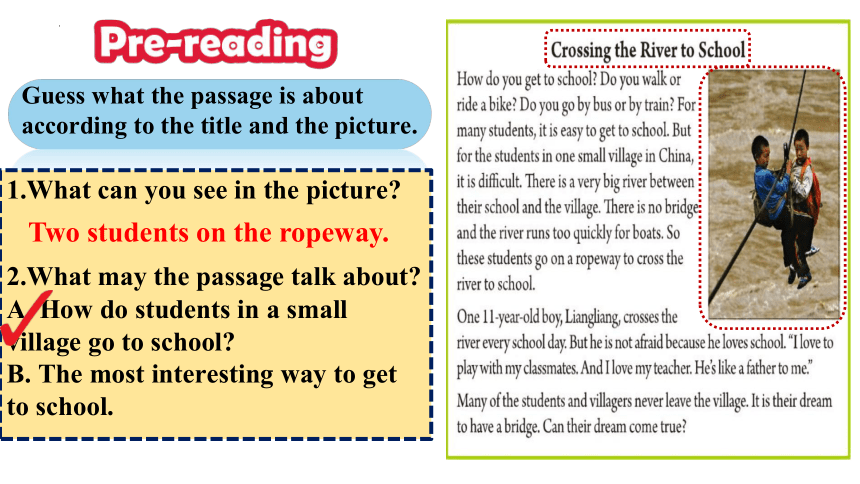
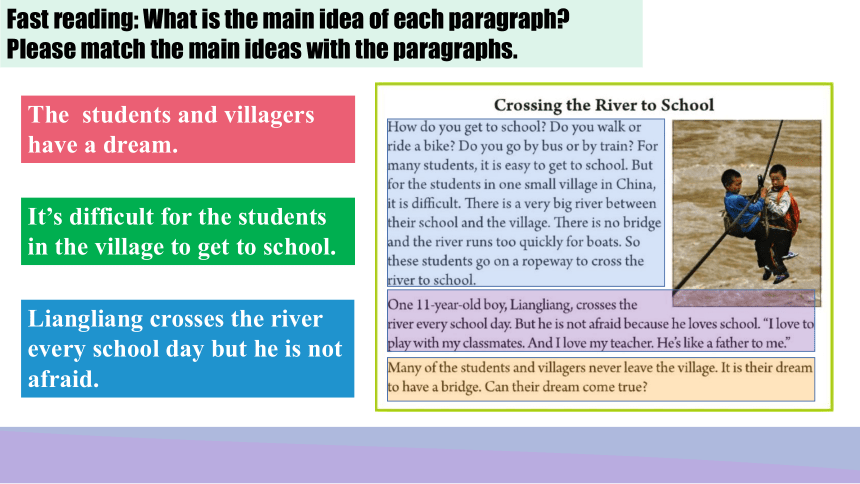

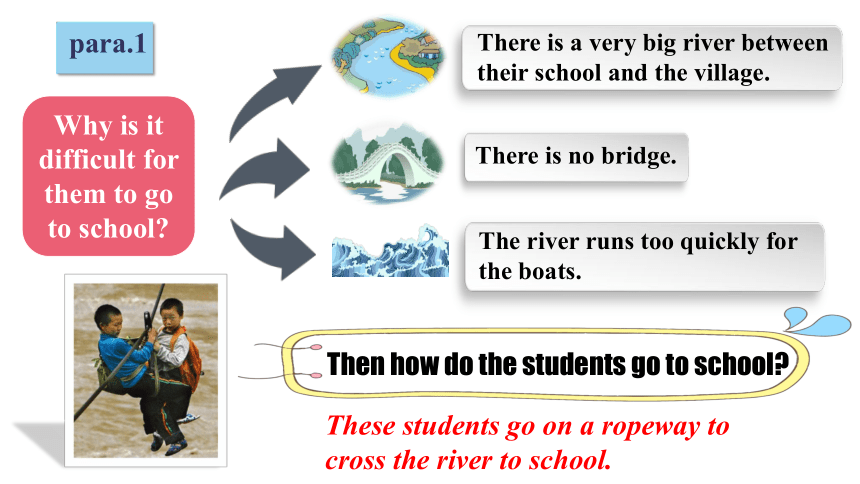
文档简介
(共53张PPT)
Unit 3
How do you get to school
Section B (2a~self-check)
01
To learn a passage about students who have to cross the river to school.
02
To learn the new words and expressions:
cross the river; between ... and ...; come true; by bus/by train; be like.
Learning objectives
A reporter is going to do a survey about the way students go to school. And here are some pictures he takes.
How do they go to school
They go to school by bus.
How does she go to school
She goes to school by train.
How does he go to school
He takes the subway to school.
How do they go to school
They ride their bikes to school.
Is it easy or difficult for them to get to school
Difficult.
Sometimes it’s difficult for those students from a poor village in the countryside to go to school.
I’m deeply touched by the video. And I want to know why.
Guess what the passage is about
according to the title and the picture.
1.What can you see in the picture
2.What may the passage talk about
A. How do students in a small village go to school
B. The most interesting way to get to school.
Two students on the ropeway.
Fast reading: What is the main idea of each paragraph Please match the main ideas with the paragraphs.
Liangliang crosses the river every school day but he is not afraid.
It’s difficult for the students in the village to get to school.
The students and villagers have a dream.
Read para.1 and try to find out why.
Crossing the River to School
/ meni/ adj.& pron.许多
for many students 对于许多学生来说
/ v l d / n.村庄;村镇
/ br d / n.桥
boat /b t / n.小船
How do you get to school Do you walk or ride a bike Do you go by
bus or by train For many students, it is easy to get to school. But for the students in one small village in China, it is difficult. There is a very big river between their school and the village. There is no bridge and the river runs too quickly for boats. So these students go on a ropeway to cross the river to school.
Why is it difficult for them to go to school
para.1
There is a very big river between their school and the village.
There is no bridge.
The river runs too quickly for the boats.
Then how do the students go to school
These students go on a ropeway to cross the river to school.
Read para.2 and answer my questions.
Crossing the River to School
/j / /j r/ n. 年;岁
/ fre d/ adj. 害怕;畏惧
/la k/ prep. 像;怎么样
play with sb. 和某人玩耍
One 11-year-old boy, Liangliang, crosses the river every school day.
But he is not afraid because he loves school. “I love to play with my classmates. And I love my teacher. He’s like a father to me.”
Many of the students and villagers never leave the village. It is their dream to have a bridge. Can their dream come true
1. How old is the boy
2. Is he afraid to go on a ropeway to cross the river to school
3.Why isn’t he afraid
He is eleven years old.
No, he isn’t.
Because he loves school. “I love to play with my classmates. And I love my teacher.
para.2
How about you
Do you love your school, classmates or your teachers
Can you keep on going on a ropeway to cross the river to school every day
Do you want to leave here
Read and think.
Why does Liangliang like the school, the classmates or the teachers
Students in small villages are taught that going to school and getting good grades are the only way to get out of the villages.
Because the teacher is like a father to him. He feels being loved.
Read para.3 and finish the task.
Crossing the River to School
villager / v l d (r)/ n. 村民
/li v/ v. 离开;留下
/dri m/ n. 梦想;睡梦 v. 做梦
实现;成为现实
true /tru / adj. 真的;符合事实的
Many of the students and villagers never leave the village. It is their dream to have a bridge. Can their dream come true
Do many of the students or villagers ever leave the village
Their dream: .
Do you think their dream can come true Why or why not
A: Yes, I do.
B: No, I don’t.
to have a bridge
No. They never leave the village.
Read para.3 and finish the task.
Maybe they can get economical and technological help from Chinese government and the charity organization.
When the students are able to do more things, they will try to change the way they go to school.
2c. Read the story again and complete the interview.
Reporter: How do you _____ to school, Liangliang
Liangliang: I go on a ropeway to ______ the river to school.
Reporter: Are you _____
Liangliang: No, I’m not. Because I _____ my school and my teachers.
I like to _____ with my classmates at school.
Reporter: Is it _______ for you to go to school
Liangliang: Yes, it is.
Reporter: Do you want to have a ______
Liangliang: Yes. It’s our dream.
Reporter: I’m sure your dream can come _____.
go
cross
afraid
love
play
difficult
bridge
true
Language points
Language points
1. Crossing the River to School 过河上学
cross v. 横过;越过
【易混辨析】cross, across与crossing
cross 动词,意为“横过;越过(横穿)” cross=
go across
across 介词或副词,意为“横过”
crossing 名词,意为“十字路口”
Language points
Language points
We can’t play mobile phones when we cross (= go across) the street.
过马路时我们不能玩手机。
Turn right at the second crossing.
在第二个十字路口向右转。
1. Crossing the River to School 过河上学
cross v. 横过;越过
Language points
Language points
2. For many students, it is easy to get to school.
对许多学生来说,到 学校是容易的。
It is + adj. + to do sth. 做某事是······的。
【用法详解】it is easy to get to school是“It is + adj. + to do sth.”结构,其中 it 是形式主语,真正的主语是后面的动词不定式短语 to do sth.。
It is important to learn English well. 学好英语很重要。
It is interesting to play basketball. 打篮球很有趣。
Language points
Language points
【易混辨析】
It is + adj. + for sb. to do sth.与 It is + adj. + of sb. to do sth.
It is + adj. + for sb. to do sth. 意为“对某人来说,做某事是······的。”形容
词是描述事物特征的词,如 important (重要的),easy (容易的),boring (乏味的)等。。
It is + adj. + of sb. to do sth. 意为“某人做某事是······的。”形容词是描述人的性格、 品质的词,如 clever (聪明的),kind/nice (善良的),silly (愚蠢的)等。
It is easy for me to sing the song. 唱这首歌对我来说很简单。
It is kind of you to help me wash the dishes.
你帮我洗盘子真是太好了。
Language points
Language points
3. There is a very big river between their school and the village.
在他们学校和村庄之间有一条很大的河。
【用法详解】between … and …为固定短语,连接两个并列的成分。其中between作介词,用于两者之间,也可用于三者或三者以上的两两之间。
There is a school between the hospital and the supermarket.
There is a ball between his feet. 他的两脚之间有一个球。
She takes the medicine between meals. 她在两餐之间服药。
between … and … 在······和······之间
Language points
Language points
4. There is no bridge and the river runs too quickly for boats.
(河上)没有桥,而且河水流得太急,不宜于小船(摆渡)。
no det.没有
【用法详解】no 在此处作限定词,修饰可数名词单数 bridge。no 修饰可数名词单数时,相当于 not a/an;修饰可数名词复数或不可数名词时,相当于 not any。
I have no dictionary at hand. = I don’t have a dictionary at hand.
我手边没有词典。
I have no footballs. = I don’t have any footballs. 我没有足球。
There is no water in the glass. = There is not any water in the glass.
玻璃杯里没有水。
Language points
Language points
4. There is no bridge and the river runs too quickly for boats.
(河上)没有桥,而且河水流得太急,不宜于小船(摆渡)。
run v. 流动
run在此处表示液体的“流动”,在不同的语境中有着不同的含义。
The river runs into the sea. 这条河流进大海。
Water is running all over the bathroom floor. 浴室里水流满地。
Language points
Language points
4. There is no bridge and the river runs too quickly for boats.
(河上)没有桥,而且河水流得太急,不宜于小船(摆渡)。
boat n. 小船
【拓展延伸】与boat相关的短语:
by boat/take the boat 乘小船
go boating 去划船
be in the same boat 处于同样的困境
We can get to the other side of the lake by boat.
我们可以乘小船到达湖对岸。
Language points
Language points
5. One 11-year-old boy, Liangliang, crosses the river every school day.亮亮,一个11岁的男孩,每个上学日过河上学。
11-year-old 11岁的
【用法详解】11-year-old是复合形容词,作前置定语修饰名词boy,需注意 year 应用单数形式,11的发音以元音音素开头,其前若有不定冠词,应用 an。
Jane is an 11-year-old girl. 简是一个11岁的女孩。
Language points
Language points
【易混辨析】...-year-old 与... year(s) old
...-year-old 为复合形容词,其结构为“基数词 + 名词(单数形式) + 形容词“,作定语修饰后面的名词,中间用连字符“-”连接。
... year(s) old 在句中作表语,year 的单复数形式取决于其前的基数词,中间不用连字符。
This is an 8-year-old boy. 这是一个8岁的男孩。
This boy is 8 years old. 这个男孩8岁。
Language points
Language points
6. But he is not afraid because he loves school. 但他并不害怕, 因为他喜欢上学。
afraid adj. 害怕;畏惧
【用法详解】 afraid 作形容词,常作表语,其用法如下:
afraid
be afraid of sth. 害怕某物
be afraid to do sth. 害怕/不敢做某事
be afraid of doing sth. 害怕做某事
be afraid + that从句 恐怕······
Language points
Language points
Cathy is afraid of the dog. 凯西怕狗。
The girl is afraid to go out at night. 这个女孩晚上害怕出门。
The man is afraid of missing the train. 这个人怕错过这趟火车。
I’m afraid I can’t do well in the running race.
恐怕我不能在跑步比赛中取得好成绩。
6. But he is not afraid because he loves school. 但他并不害怕, 因为他喜欢上学。
afraid adj. 害怕;畏惧
Language points
Language points
7. He’s like a father to me. 他对我来说就像父亲一样。
like prep. 像;怎么样
【用法详解】
like 在句中作介词,常构成短语 be like (像······)
或look like (看起来像······) ,后接名词或代词作宾语。
Kate is like her mother. 凯特像她的妈妈。
Your new eraser looks like an apple.
你的新橡皮看起来像一个苹果。
Language points
Language points
【拓展延伸】
(1) “What’s sb. like ”意为“某人怎么样?”侧重于询问某人内在的性格、品质等。
—What’s your Chinese teacher like 你的语文老师怎么样?
—He’s very kind. 他很善良。
(2) “What does sb. look like ” 意为“某人长得怎么样?” ,侧重于询问某人的外表。
—What does she look like 她长得怎么样
—She is tall and beautiful, just like her mother.
她长得又高又漂亮,就像她妈妈一样。
Group work
We think we should…
First, we can
Then, the government(政府)can…
At last, the villagers can…
Expressions:
send 寄,发送 appeal to 呼吁
donate 捐赠 build 建造
We should cherish the chance to go to school.
We should cherish the comfortable life given by our parents.
We should realize the importance of education.
How do my friends go to school
on foot
by bike
by bus
by train
by subway
How do you get to school
I also write an e-mail to Tom, my pen pal in America. How does he go to school
3a. Read the e-mail from your pen pal Tom in the US. Fill in the blanks with the words in the box.
Hi there,
How are you Thanks for your last e-mail. You want to know how I _____ school, right Well, I usually ______ my home at about 8:00 and _____ to the bus stop. The school bus usually comes at about 8:15. My school is about 20 _________ from my home. It _____ about 40 minutes to get there by bus. The bus ride is never _______ because I always talk to my classmates. What about you How do you get to school
Tom
kilometers
get to
takes
walk
boring
leave
get to
leave
walk
kilometers
takes
boring
Structure of an e-mail
the receiver,
the writer,
How do I go to school
注意邮件的格式
First
Then
Next
Greet and show the purpose of writing.
Introduce the progress of going to school(time, way, distance).
Share your feelings on the way to school.
At last
Ask for his way to school
注意邮件的格式
Read the e-mail again and fill in the chart.
When How How far How long How is the trip
At about 8:00
walks;
takes the school bus
20 kilometers
40 minutes
never boring
Write an e-mail to Tom and tell him how you get to school. These questions may help you.
1. When do you leave home
2. How do you get to school
3. How far is it from your home to school
4. How long does it take you to get to school
5. Do you like your trip to school
When
How
How far
How long
Feelings
How to write it
When
How
How far
How long
Feelings
I usually leave home at …
I walk/take/ride …; I go … by …
It is … kilometers from … to …
It takes … minutes to …
The trip/bus ride is …
Useful expressions:
Phrases:
leave home 离开家
get to the bus stop 到达公共汽车站
go to school on foot/by bike/bus/subway ... walk/ride a bike/take a bus/subway ... to school
走路/骑自行车/乘公共汽车车/乘地铁······去上学
Useful expressions:
Sentences:
1. Sb. go(es) to school by ... 某人乘······去上学。
2. It takes sb. some time to do sth. 某人花费多少时间做某事。
3. It’s about ... kilometers from my home to school.
从我家到学校大约······千米。
4. It’s about twenty minutes’ walk. 步行大概20分钟。
5. It’s about 15 minutes by bike. 骑自行车大概15分钟。
6. Sb. like(s) riding to school. 某人喜欢骑自行车去上学。
Possible version
Dear Tom,
How are you I want to tell you how I get to school.
Well, I usually leave my home at 6:40 and walk to the bus stop. Then I take the No.8 bus to my school. It is about ten kilometers from my home to school. It takes about 20 minutes to get to school. I am very happy to go to school by bus because I can meet my classmates, but I must get up early, so sometimes I am tired. Do you think so
Mrs. Tang
Self-check
take
walk
ride
drive
by
bus, train, plane, bike, subway, boat, car
a/the bus, a/the train, a/the plane, the subway, a/the boat
a/the bike
a/the car, a/the bus, a/the train
take
walk
ride
drive
by
bus
train
car,
bike
plane
subway
boat
1.Use the words in the boxes to form as many expressions as possible.
Self-check
2.Look at the chart below. Write at least five questions. Then answer the questions with the information in the chart.
Who Where How How far How long
Tony from home to school by bike 5 km 20 minutes
Mary from home to the library by bus 15 km 40 minutes
Self-check
2.Look at the chart below. Write at least five questions. Then answer the questions with the information in the chart.
Questions Answers
1. How does Tony get to school He gets to school by bike.
6. How long does it take Mary to get to the library by bus
2. How does Mary get to the library from home
3. How far is it from Tony’s home to school
4. How far is it from Mary’s home to the library
5. How long does it take Tony to get to school by bike
It takes 40 minutes.
She gets to the library by bus.
It is 5 kilometers.
It is 15 kilometers.
It takes 20 minutes.
Exercises
一、用所给词的适当形式填空。
1.Lily _______(ride) to school every day.
2.There are five ________(hundred) people in the room.
3.His brother has to ________(cross) a bridge to get to work.
4.Where does Jack ________(live)
5.Mr. King usually takes the ________(boat) to the village.
rides
hundred
cross
live
boat
二、单项选择。
1.Jeff goes to work _______ and his wife goes to work ______.
A. by car; on her bike B. by a car; on her bike
C. by cars; by bikes D. by his car; by bike
2.What do you ________ the transportation in your city
A. think about B. think of C. think over D. think
3.—_______ does it take you to get to Beijing
—Twenty hours.
A. How often B. How far C. How many D. How long
A
B
D
Exercises
4.How ______ is it _______ your school to the Children’s Palace
A. long; to B. far; to C. long; from D. far; from
5.—How do you ________there
—I take the train.
A. get B. get to C. gets D. gets to
6.Look! There is _______ over there. Do you know him
A. a 8-year-old boy B. an 8-year-old boy
C. a 8-years old boy D. an 8-years old boy
D
A
B
Exercises
三、连词成句。
1.does, school, Anna, far, live, from, how _____________________________________________________
2.how long, it, does, take, you, get, to, home, from, to, school _____________________________________________________
3.does, school, walk, to, your friend _____________________________________________________
How far does Anna live from school
How long does it take you to get to school from home
Does your friend walk to school
Exercises
4.the, it, a, is, to, cross, river, on, ropeway, difficult _____________________________________________________
5.a, do, ride, you, or, bike, walk _____________________________________________________
It is difficult to cross the river on a ropeway.
Do you walk or ride a bike
三、连词成句。
Exercises
Unit 3
Thanks for your attention!
Section B (2a~self-check)
Unit 3
How do you get to school
Section B (2a~self-check)
01
To learn a passage about students who have to cross the river to school.
02
To learn the new words and expressions:
cross the river; between ... and ...; come true; by bus/by train; be like.
Learning objectives
A reporter is going to do a survey about the way students go to school. And here are some pictures he takes.
How do they go to school
They go to school by bus.
How does she go to school
She goes to school by train.
How does he go to school
He takes the subway to school.
How do they go to school
They ride their bikes to school.
Is it easy or difficult for them to get to school
Difficult.
Sometimes it’s difficult for those students from a poor village in the countryside to go to school.
I’m deeply touched by the video. And I want to know why.
Guess what the passage is about
according to the title and the picture.
1.What can you see in the picture
2.What may the passage talk about
A. How do students in a small village go to school
B. The most interesting way to get to school.
Two students on the ropeway.
Fast reading: What is the main idea of each paragraph Please match the main ideas with the paragraphs.
Liangliang crosses the river every school day but he is not afraid.
It’s difficult for the students in the village to get to school.
The students and villagers have a dream.
Read para.1 and try to find out why.
Crossing the River to School
/ meni/ adj.& pron.许多
for many students 对于许多学生来说
/ v l d / n.村庄;村镇
/ br d / n.桥
boat /b t / n.小船
How do you get to school Do you walk or ride a bike Do you go by
bus or by train For many students, it is easy to get to school. But for the students in one small village in China, it is difficult. There is a very big river between their school and the village. There is no bridge and the river runs too quickly for boats. So these students go on a ropeway to cross the river to school.
Why is it difficult for them to go to school
para.1
There is a very big river between their school and the village.
There is no bridge.
The river runs too quickly for the boats.
Then how do the students go to school
These students go on a ropeway to cross the river to school.
Read para.2 and answer my questions.
Crossing the River to School
/j / /j r/ n. 年;岁
/ fre d/ adj. 害怕;畏惧
/la k/ prep. 像;怎么样
play with sb. 和某人玩耍
One 11-year-old boy, Liangliang, crosses the river every school day.
But he is not afraid because he loves school. “I love to play with my classmates. And I love my teacher. He’s like a father to me.”
Many of the students and villagers never leave the village. It is their dream to have a bridge. Can their dream come true
1. How old is the boy
2. Is he afraid to go on a ropeway to cross the river to school
3.Why isn’t he afraid
He is eleven years old.
No, he isn’t.
Because he loves school. “I love to play with my classmates. And I love my teacher.
para.2
How about you
Do you love your school, classmates or your teachers
Can you keep on going on a ropeway to cross the river to school every day
Do you want to leave here
Read and think.
Why does Liangliang like the school, the classmates or the teachers
Students in small villages are taught that going to school and getting good grades are the only way to get out of the villages.
Because the teacher is like a father to him. He feels being loved.
Read para.3 and finish the task.
Crossing the River to School
villager / v l d (r)/ n. 村民
/li v/ v. 离开;留下
/dri m/ n. 梦想;睡梦 v. 做梦
实现;成为现实
true /tru / adj. 真的;符合事实的
Many of the students and villagers never leave the village. It is their dream to have a bridge. Can their dream come true
Do many of the students or villagers ever leave the village
Their dream: .
Do you think their dream can come true Why or why not
A: Yes, I do.
B: No, I don’t.
to have a bridge
No. They never leave the village.
Read para.3 and finish the task.
Maybe they can get economical and technological help from Chinese government and the charity organization.
When the students are able to do more things, they will try to change the way they go to school.
2c. Read the story again and complete the interview.
Reporter: How do you _____ to school, Liangliang
Liangliang: I go on a ropeway to ______ the river to school.
Reporter: Are you _____
Liangliang: No, I’m not. Because I _____ my school and my teachers.
I like to _____ with my classmates at school.
Reporter: Is it _______ for you to go to school
Liangliang: Yes, it is.
Reporter: Do you want to have a ______
Liangliang: Yes. It’s our dream.
Reporter: I’m sure your dream can come _____.
go
cross
afraid
love
play
difficult
bridge
true
Language points
Language points
1. Crossing the River to School 过河上学
cross v. 横过;越过
【易混辨析】cross, across与crossing
cross 动词,意为“横过;越过(横穿)” cross=
go across
across 介词或副词,意为“横过”
crossing 名词,意为“十字路口”
Language points
Language points
We can’t play mobile phones when we cross (= go across) the street.
过马路时我们不能玩手机。
Turn right at the second crossing.
在第二个十字路口向右转。
1. Crossing the River to School 过河上学
cross v. 横过;越过
Language points
Language points
2. For many students, it is easy to get to school.
对许多学生来说,到 学校是容易的。
It is + adj. + to do sth. 做某事是······的。
【用法详解】it is easy to get to school是“It is + adj. + to do sth.”结构,其中 it 是形式主语,真正的主语是后面的动词不定式短语 to do sth.。
It is important to learn English well. 学好英语很重要。
It is interesting to play basketball. 打篮球很有趣。
Language points
Language points
【易混辨析】
It is + adj. + for sb. to do sth.与 It is + adj. + of sb. to do sth.
It is + adj. + for sb. to do sth. 意为“对某人来说,做某事是······的。”形容
词是描述事物特征的词,如 important (重要的),easy (容易的),boring (乏味的)等。。
It is + adj. + of sb. to do sth. 意为“某人做某事是······的。”形容词是描述人的性格、 品质的词,如 clever (聪明的),kind/nice (善良的),silly (愚蠢的)等。
It is easy for me to sing the song. 唱这首歌对我来说很简单。
It is kind of you to help me wash the dishes.
你帮我洗盘子真是太好了。
Language points
Language points
3. There is a very big river between their school and the village.
在他们学校和村庄之间有一条很大的河。
【用法详解】between … and …为固定短语,连接两个并列的成分。其中between作介词,用于两者之间,也可用于三者或三者以上的两两之间。
There is a school between the hospital and the supermarket.
There is a ball between his feet. 他的两脚之间有一个球。
She takes the medicine between meals. 她在两餐之间服药。
between … and … 在······和······之间
Language points
Language points
4. There is no bridge and the river runs too quickly for boats.
(河上)没有桥,而且河水流得太急,不宜于小船(摆渡)。
no det.没有
【用法详解】no 在此处作限定词,修饰可数名词单数 bridge。no 修饰可数名词单数时,相当于 not a/an;修饰可数名词复数或不可数名词时,相当于 not any。
I have no dictionary at hand. = I don’t have a dictionary at hand.
我手边没有词典。
I have no footballs. = I don’t have any footballs. 我没有足球。
There is no water in the glass. = There is not any water in the glass.
玻璃杯里没有水。
Language points
Language points
4. There is no bridge and the river runs too quickly for boats.
(河上)没有桥,而且河水流得太急,不宜于小船(摆渡)。
run v. 流动
run在此处表示液体的“流动”,在不同的语境中有着不同的含义。
The river runs into the sea. 这条河流进大海。
Water is running all over the bathroom floor. 浴室里水流满地。
Language points
Language points
4. There is no bridge and the river runs too quickly for boats.
(河上)没有桥,而且河水流得太急,不宜于小船(摆渡)。
boat n. 小船
【拓展延伸】与boat相关的短语:
by boat/take the boat 乘小船
go boating 去划船
be in the same boat 处于同样的困境
We can get to the other side of the lake by boat.
我们可以乘小船到达湖对岸。
Language points
Language points
5. One 11-year-old boy, Liangliang, crosses the river every school day.亮亮,一个11岁的男孩,每个上学日过河上学。
11-year-old 11岁的
【用法详解】11-year-old是复合形容词,作前置定语修饰名词boy,需注意 year 应用单数形式,11的发音以元音音素开头,其前若有不定冠词,应用 an。
Jane is an 11-year-old girl. 简是一个11岁的女孩。
Language points
Language points
【易混辨析】...-year-old 与... year(s) old
...-year-old 为复合形容词,其结构为“基数词 + 名词(单数形式) + 形容词“,作定语修饰后面的名词,中间用连字符“-”连接。
... year(s) old 在句中作表语,year 的单复数形式取决于其前的基数词,中间不用连字符。
This is an 8-year-old boy. 这是一个8岁的男孩。
This boy is 8 years old. 这个男孩8岁。
Language points
Language points
6. But he is not afraid because he loves school. 但他并不害怕, 因为他喜欢上学。
afraid adj. 害怕;畏惧
【用法详解】 afraid 作形容词,常作表语,其用法如下:
afraid
be afraid of sth. 害怕某物
be afraid to do sth. 害怕/不敢做某事
be afraid of doing sth. 害怕做某事
be afraid + that从句 恐怕······
Language points
Language points
Cathy is afraid of the dog. 凯西怕狗。
The girl is afraid to go out at night. 这个女孩晚上害怕出门。
The man is afraid of missing the train. 这个人怕错过这趟火车。
I’m afraid I can’t do well in the running race.
恐怕我不能在跑步比赛中取得好成绩。
6. But he is not afraid because he loves school. 但他并不害怕, 因为他喜欢上学。
afraid adj. 害怕;畏惧
Language points
Language points
7. He’s like a father to me. 他对我来说就像父亲一样。
like prep. 像;怎么样
【用法详解】
like 在句中作介词,常构成短语 be like (像······)
或look like (看起来像······) ,后接名词或代词作宾语。
Kate is like her mother. 凯特像她的妈妈。
Your new eraser looks like an apple.
你的新橡皮看起来像一个苹果。
Language points
Language points
【拓展延伸】
(1) “What’s sb. like ”意为“某人怎么样?”侧重于询问某人内在的性格、品质等。
—What’s your Chinese teacher like 你的语文老师怎么样?
—He’s very kind. 他很善良。
(2) “What does sb. look like ” 意为“某人长得怎么样?” ,侧重于询问某人的外表。
—What does she look like 她长得怎么样
—She is tall and beautiful, just like her mother.
她长得又高又漂亮,就像她妈妈一样。
Group work
We think we should…
First, we can
Then, the government(政府)can…
At last, the villagers can…
Expressions:
send 寄,发送 appeal to 呼吁
donate 捐赠 build 建造
We should cherish the chance to go to school.
We should cherish the comfortable life given by our parents.
We should realize the importance of education.
How do my friends go to school
on foot
by bike
by bus
by train
by subway
How do you get to school
I also write an e-mail to Tom, my pen pal in America. How does he go to school
3a. Read the e-mail from your pen pal Tom in the US. Fill in the blanks with the words in the box.
Hi there,
How are you Thanks for your last e-mail. You want to know how I _____ school, right Well, I usually ______ my home at about 8:00 and _____ to the bus stop. The school bus usually comes at about 8:15. My school is about 20 _________ from my home. It _____ about 40 minutes to get there by bus. The bus ride is never _______ because I always talk to my classmates. What about you How do you get to school
Tom
kilometers
get to
takes
walk
boring
leave
get to
leave
walk
kilometers
takes
boring
Structure of an e-mail
the receiver,
the writer,
How do I go to school
注意邮件的格式
First
Then
Next
Greet and show the purpose of writing.
Introduce the progress of going to school(time, way, distance).
Share your feelings on the way to school.
At last
Ask for his way to school
注意邮件的格式
Read the e-mail again and fill in the chart.
When How How far How long How is the trip
At about 8:00
walks;
takes the school bus
20 kilometers
40 minutes
never boring
Write an e-mail to Tom and tell him how you get to school. These questions may help you.
1. When do you leave home
2. How do you get to school
3. How far is it from your home to school
4. How long does it take you to get to school
5. Do you like your trip to school
When
How
How far
How long
Feelings
How to write it
When
How
How far
How long
Feelings
I usually leave home at …
I walk/take/ride …; I go … by …
It is … kilometers from … to …
It takes … minutes to …
The trip/bus ride is …
Useful expressions:
Phrases:
leave home 离开家
get to the bus stop 到达公共汽车站
go to school on foot/by bike/bus/subway ... walk/ride a bike/take a bus/subway ... to school
走路/骑自行车/乘公共汽车车/乘地铁······去上学
Useful expressions:
Sentences:
1. Sb. go(es) to school by ... 某人乘······去上学。
2. It takes sb. some time to do sth. 某人花费多少时间做某事。
3. It’s about ... kilometers from my home to school.
从我家到学校大约······千米。
4. It’s about twenty minutes’ walk. 步行大概20分钟。
5. It’s about 15 minutes by bike. 骑自行车大概15分钟。
6. Sb. like(s) riding to school. 某人喜欢骑自行车去上学。
Possible version
Dear Tom,
How are you I want to tell you how I get to school.
Well, I usually leave my home at 6:40 and walk to the bus stop. Then I take the No.8 bus to my school. It is about ten kilometers from my home to school. It takes about 20 minutes to get to school. I am very happy to go to school by bus because I can meet my classmates, but I must get up early, so sometimes I am tired. Do you think so
Mrs. Tang
Self-check
take
walk
ride
drive
by
bus, train, plane, bike, subway, boat, car
a/the bus, a/the train, a/the plane, the subway, a/the boat
a/the bike
a/the car, a/the bus, a/the train
take
walk
ride
drive
by
bus
train
car,
bike
plane
subway
boat
1.Use the words in the boxes to form as many expressions as possible.
Self-check
2.Look at the chart below. Write at least five questions. Then answer the questions with the information in the chart.
Who Where How How far How long
Tony from home to school by bike 5 km 20 minutes
Mary from home to the library by bus 15 km 40 minutes
Self-check
2.Look at the chart below. Write at least five questions. Then answer the questions with the information in the chart.
Questions Answers
1. How does Tony get to school He gets to school by bike.
6. How long does it take Mary to get to the library by bus
2. How does Mary get to the library from home
3. How far is it from Tony’s home to school
4. How far is it from Mary’s home to the library
5. How long does it take Tony to get to school by bike
It takes 40 minutes.
She gets to the library by bus.
It is 5 kilometers.
It is 15 kilometers.
It takes 20 minutes.
Exercises
一、用所给词的适当形式填空。
1.Lily _______(ride) to school every day.
2.There are five ________(hundred) people in the room.
3.His brother has to ________(cross) a bridge to get to work.
4.Where does Jack ________(live)
5.Mr. King usually takes the ________(boat) to the village.
rides
hundred
cross
live
boat
二、单项选择。
1.Jeff goes to work _______ and his wife goes to work ______.
A. by car; on her bike B. by a car; on her bike
C. by cars; by bikes D. by his car; by bike
2.What do you ________ the transportation in your city
A. think about B. think of C. think over D. think
3.—_______ does it take you to get to Beijing
—Twenty hours.
A. How often B. How far C. How many D. How long
A
B
D
Exercises
4.How ______ is it _______ your school to the Children’s Palace
A. long; to B. far; to C. long; from D. far; from
5.—How do you ________there
—I take the train.
A. get B. get to C. gets D. gets to
6.Look! There is _______ over there. Do you know him
A. a 8-year-old boy B. an 8-year-old boy
C. a 8-years old boy D. an 8-years old boy
D
A
B
Exercises
三、连词成句。
1.does, school, Anna, far, live, from, how _____________________________________________________
2.how long, it, does, take, you, get, to, home, from, to, school _____________________________________________________
3.does, school, walk, to, your friend _____________________________________________________
How far does Anna live from school
How long does it take you to get to school from home
Does your friend walk to school
Exercises
4.the, it, a, is, to, cross, river, on, ropeway, difficult _____________________________________________________
5.a, do, ride, you, or, bike, walk _____________________________________________________
It is difficult to cross the river on a ropeway.
Do you walk or ride a bike
三、连词成句。
Exercises
Unit 3
Thanks for your attention!
Section B (2a~self-check)
同课章节目录
- Unit 1 Can you play the guitar?
- Section A
- Section B
- Unit 2 What time do you go to school?
- Section A
- Section B
- Unit 3 How do you get to school?
- Section A
- Section B
- Unit 4 Don't eat in class.
- Section A
- Section B
- Unit 5 Why do you like pandas?
- Section A
- Section B
- Unit 6 I'm watching TV.
- Section A
- Section B
- Review of Units 1-6
- Unit 7 It's raining!
- Section A
- Section B
- Unit 8 Is there a post office near here?
- Section A
- Section B
- Unit 9 What does he look like?
- Section A
- Section B
- Unit 10 I'd like some noodles.
- Section A
- Section B
- Unit 11 How was your school trip?
- Section A
- Section B
- Unit 12 What did you do last weekend?
- Section A
- Section B
